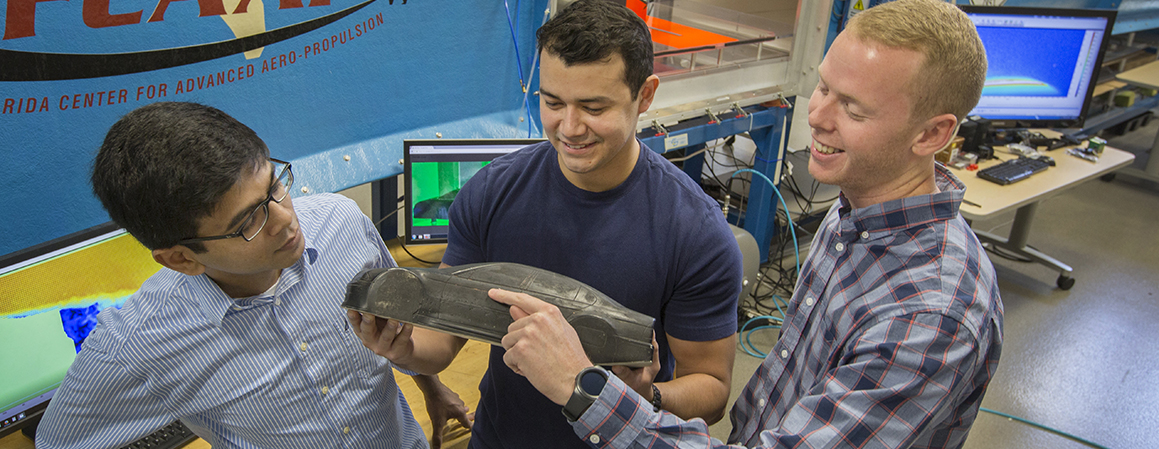Description of Major
The Bachelor of Science (BS) program in the Department of Mechanical Engineering is designed to provide background for a wide variety of careers. The discipline of mechanical engineering is very broad, but generally emphasizes an appropriate mix of thermal science, mechanics and materials, dynamic systems, and design. Graduates typically enter various energy, aerospace, product manufacturing industries, or government laboratories.
The undergraduate program is designed to impart a broad knowledge in basic and engineering sciences and to provide a solid understanding of contemporary engineering practices. The program also seeks to provide students with a foundation in communications skills, principles of economics, and other fundamentals upon which they will draw in their professional careers. Special emphasis is placed on communications skills by requiring extensive written laboratory reports and design project presentations. Computer literacy is bolstered by a variety of course assignments throughout the program and especially in the design courses, wherein students are exposed to a number of design software programs widely used in the engineering industry.
ABET
The Accreditation Board for Engineering and Technology (ABET) requires that all students graduating from an ABET-accredited program meet certain requirements. Completion of the A. A. degree will not meet these requirements. Prospective majors should select courses after consulting an advisor.
Prerequisite Coursework
Prerequisite Coursework
Students must complete the following prerequisites required for admission in preparation for the upper division major. Students are encouraged to complete these in the freshman and sophomore years. All may also apply to other requirements.
The following lists the common program prerequisites or their substitutions, necessary for admission into this upper-division degree program:
- MAC X311 or MAC X281
- MAC X312 or MAC X282
- MAC X313 or MAC X283
- MAP X302 or MAP X305
- CHM X045/X045L or CHM X045C, or CHS X440/X440L, or CHSX440 and CHMX045L
- PHY X048/X048L or PHY X048C, or PHY X043 and PHY X048L, or PHYX041 and PHYX048L
- PHY X049/X049L or PHY X049C, or PHY X044 and PHY X049L, or PHYX042 and PHYX049L
Note: State-wide common prerequisites are always under review. Please visit https://dlss.flvc.org/admin-tools/common-prerequisites-manuals for a current list of state-approved prerequisites.
Pre-Engineering Program Requirements:
All first-year engineering students (first year in college or first-year transfer students) are initially coded as pre- engineering students until they satisfy the following pre-engineering requirements students must:
- Have an overall GPA of 2.00 or better,
- Achieve a grade of ‘C minus’ or better, from any institution attended, in First Year Engineering Laboratory (FYEL), Calculus I, Calculus II, and General Physics I. A single repeated attempt in only one of the four (4) courses listed above is permitted,
- Complete FYEL by the end of the summer semester of their freshman year, and
- Achieve conditions (A) and (B) by the end of the spring semester of their sophomore year.
Admission Requirements
Requirements for Progression to the Upper-Division:
To be admitted, students must complete at least 52 hours of credit with an FSU GPA of a 2.00, including at least one-half of the required hours in the General Education program, including all of the Area I English and math. In addition, the following requirements must be met: a grade of 'C minus' or better in MAC2311. Students must not be in violation of the pre-engineering program requirements.
Transfer Requirements:
Students wishing to transfer into the FAMU-FSU College of Engineering must meet the following criteria:
- Must earn a grade of "C minus" or better on the first attempt of the courses designated in the Pre-Engineering curriculum (Calculus I, Calculus II, General Physics I with calculus*, Pre-Engineering Lab) at any institution attended. One repeated attempt out of all pre-engineering courses is permitted.
- * Students who wish to major in Chemical or Biomedical Engineering shall replace Physics I with General Chemistry I for their Pre-Engineering sequence.
- Transfer students who have one repeated attempt in the pre-engineering courses must have already completed all pre-engineering courses (excluding Pre-Engineering Lab).
- Transfer students who will earn an AA or have more than 60 hours of transfer credit prior to enrollment at the College must have completed at least Calculus I. It is strongly preferred that AA transfer students have the majority of the pre-engineering courses completed before arriving (excluding Pre-Engineering Lab).
Coursework
Major Program of Studies at FSU: (107-108 hours)
- EGN1004L First Year Engineering Laboratory (1). Must be completed as part of the pre-engineering requirements.
Mathematics and Basic Sciences: (35-36 hours)
- CHM 1045 General Chemistry I (3)
- CHM 1045L General Chemistry I Laboratory (1)
- COP 3014 Programming I (3)
- MAC 2311 Calculus with Analytical Geometry I (4)
- MAC 2312 Calculus with Analytical Geometry II (4)
- MAC 2313 Calculus with Analytical Geometry III (5)
- MAP 3305 Engineering Mathematics I (3) or MAP 2302 Ordinary Differential Equations (3)
- PHY 2048C General Physics A (5)
- PHY 2049C General Physics B (5)
- XXX XXXX Math Option (3-4)
The math option is intended to provide additional math expertise oriented toward various areas of engineering. Students must choose from the following list of approved classes: MAP 3306 or STA 3032, Alternates: EGN3454, MAD 3401, MAD 3703, MAP 4341 or MAS 3105.
General Engineering Core: (3 hours)
- EEL 3003 Introduction to Electrical Engineering (3)
Required Mechanical Engineering: (67 hours)
- EML 3102 (3) Engineering Thermodynamics
EML 3002L (3) Mechanical Engineering Tools Lab
EML 3004 (3) Engineering Statics
EML 3011 (3) Mechanics and Materials
EML 3012 (3) Intermediate Mechanics and Materials
EML 3012L (1) Mechanics and Materials Lab
EML 3013 (3) Dynamic
EML 3014C (3) System Dynamics and Vibrations
EML 3015C (4) Thermal-Fluids I: Fluid Mechanics
EML 3016 (3) Thermal-Fluids II: Heat Transfer
EML 3017C (4) Mechanical Systems I
EML 3018C (4) Mechanical Systems II
EML 3234 (3) Materials Science and Engineering
EML3811 (1) Introduction to Mechatronics
EML3811L (2) Mechatronics Lab
EML 4304 (2) Experiments in Thermal and Fluid Sciences
EML 4304L (1) Experiments in Thermal and Fluid Sciences Lab
EML 4550 (3) Engineering Design Methods
EML 4551C, EML 4552C (3) Senior Design I & II
Technical electives are generally intended to develop depth in an area of interest and should form a coherent area of concentration. A minimum of three technical electives (nine semester hours) must be in Mechanical Engineering. All technical elective courses must be selected from the approved list of suitable technical elective courses posted on the Departmental Web site.
EML 3004 includes a math/physics test based on the material covered in Calculus I, Calculus II, and Physics I. Students may take this test at any time before or during their enrollment in EML 3004.
Computer Skills Competency: (0 hours beyond major)
Undergraduate majors in mechanical engineering satisfy this requirement by earning a grade of “C minus” or higher in EML 3002L Mechanical Engineering Tools Lab (3).
Upper Division Writing (UDW): (0 hours beyond major)
Undergraduate majors in mechanical engineering satisfy the Upper Division Writing (UDW) requirement by earning a grade of “C minus” or higher in EML 3012C Mechanics and Materials II (3).
Scholarship in Practice (SIP) and Oral Communication Competency Requirement (OCCR): (0 hours beyond major)
Undergraduate majors in mechanical engineering satisfy both the Scholarship in Practice (SIP) and Oral Communication Competency requirements by earning a grade of “C” or higher in both EML 4551C Senior Design Project I (3) and EML 4552C Senior Design Project II (3).
Minimum Program Requirements - Summary
- Total Hrs. Required: 128
- General Education: 36
- Major Coursework: 107-108
- Minor Coursework: 0
- Computer Skills Competency: 0 beyond major coursework
- Upper Division Writing: 0 beyond major coursework
- Scholarship in Practice: 0 beyond major coursework
- Oral Communication Competency: 0 beyond major coursework
- Electives: 0
*Note: Engineering students satisfy the natural science and the mathematics area requirements of General Education through coursework in the Engineering Core. Students not prepared to begin mathematics with Calculus I (MAC 2311) will need to take additional prerequisite hours in mathematics: MAC 1105, 1114, and/or 1140. All students should take the math placement test (ALEKS) to determine proper placement.
Mapping
Mapping is FSU’s academic advising and monitoring system. Academic progress is monitored each Fall and Spring semester to ensure that students are on course to earn their degree in a timely fashion. Transfer students must meet mapping guidelines to be accepted into their majors. You may view the map for this major in the Academic Guide.
Remarks
- A minimum of 45 hours at the 3000 level or above, 30 of which must be taken at this University.
- Half of the major course semester hours must be completed in residence at this University.
- The final 30 hours must be completed in residence at this University.
Mechanical Engineering Faculty

Mauricio Chagas, PhD
Holley A-211-U
(850) 770-2279
m.chagas@fsu.edu

Yvonne Traynham, PhD
Holley A-211-W
(850) 770-2245
ytraynham@fsu.edu

Twan Capehart, PhD
Holley A-211-W
(850) 770-2208
tpc09@fsu.edu
Employment Information
Salary Information: National Association of Colleges and Employers, Occupational Outlook Handbook
Job Titles Related to this Major with a Bachelor of Science in Mechanical Engineering: Basic Engineering: Applied Mechanics, Bioengineering, Fluids Engineering, Heat Transfer, Tribology. Energy Conversion: Internal Combustion Engines, Fuels and Combustion Technologies, Gas Turbine, Nuclear Engineering, Power. Energy Resources: Advanced Energy Systems, Ocean Engineering, Petroleum, Solar Energy. Environment and Transportation: Aerospace, Air Pollution Control, Noise Control and Acoustics, Rail Transportation, Solid Waste Processing. General Engineering: Management, Safety, Technology and Society. Materials and Structures: Materials, Pressure Vessels and Piping, NDE Engineering, Offshore Mechanics and Arctic Engineering. Manufacturing: Materials Handling Engineering, Plant Engineering and Maintenance, Process Industries, Production Engineering, Textile Industries. Systems and Design: Computer Engineering, Design Engineering, Dynamic Systems and Control, Electrical and Electronic Packaging.
Representative Employers: Government, Private Business, Industry, Education

